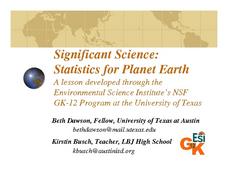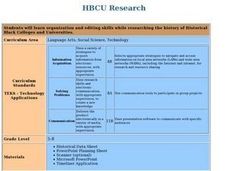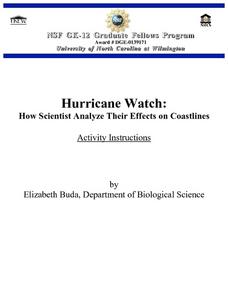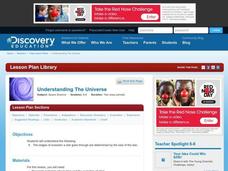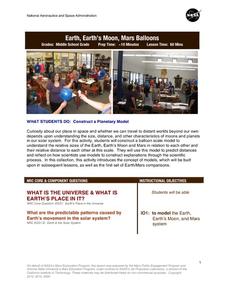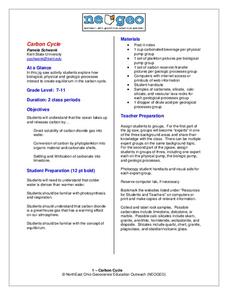International Technology Education Association
Telescope as Time Machine
This resource provides an explanation of NASA's GALEX mission and how the space-based telescope can view distant galaxies as they were billions of years ago. The resource also discusses the other aspects of galaxies that GALEX is able to...
Curated OER
Newton's Theory of Universal Gravitation
Students explore how Newton tied together the gravity observed on Earth and the motion of the Moon. They apply an earlier lesson about centripetal forces.
Curated OER
Significant Science: Statistics for Planet Earth
Ninth graders discover how statistics are used to interpret results of scientific experiments. Students write hypotheses and test the hypotheses by collecting data and organizing the data. Students graph their data to produce a visual....
Curated OER
Following Plans
Students learn to follow a specific plan in order to do something or get somewhere. In this following directions activity, students explore key vocabulary related to following plans, complete fun activities that require attention to...
Curated OER
`Great Debate' Lesson Plan for Undergraduates
Students study the Curtis- Shapley debate which highlighted the view of human place in the universe. They examine the clash of these two astronomers in a debate which took place in 1920.
Curated OER
Mission Impossible! Are We Alone in the Universe, or Are We Just One of Its Citizens?
High schoolers examine NASA strategy for scientifically studying any celestial body. They brainstorm about all previous space explorations and missions they can recall, and propose an expedition plan to become space explorers of the...
Curated OER
Periodic Table Lesson Plan
Students describe how elements are arranged on the periodic table. They compare metals, nonmetals, and metalloids based on their properties and on their locations in the periodic table. Students describe the differences between a...
Curated OER
Historical Black Colleges and Universities (HBCU) Research
Students, in groups, practice organization and editing skills as they research the history of Historical Black Colleges and Universities (HBCU). they create a PowerPoint presentation of their research.
Curated OER
Hurricane Watch: How Scientist Analyze Their Effects on Coastlines
Eighth graders are able to evaluate the forces that shape the lithosphere. They explore background information on hurricanes by completing a webquest and answering questions. Students present their reports to the class. The class...
Curated OER
The Universe
Students recognize that the stages of evolution a star goes through are determined by the size of the star. They conduct research to draw a set of diagrams illustrating the stages in the evolution of three sizes of stars.
Curated OER
Woman on a Mission
Students explore the July 1999 space shuttle mission while learning how to cite Web sites in correct MLA bibliographical format. They discuss the mission's goals and historic importance as the first American space flight commanded by a...
Curated OER
Science as a Source of Social Controversy
Students research the two opposing views and biographical information about Ptolemy and Copernicus in order to be familiar with the societal viewpoints that influenced the thinking of these two scientists. Students role-play supporters...
American Chemical Society
Joseph Priestley, Discoverer of Oxygen
Do you want to hear a joke about nitrogen and oxygen? NO. We all know there is oxygen in the air and that plants produce oxygen, but how was it discovered? Scholars read a handout, answer questions, and analyze material in the...
Curated OER
How Are Stars Like People?
A beautifully written lesson plan delves into a beautiful topic: stellar population. Engage aspiring astronomers with activities that examine human populations and then transition onto the stars of the universe. Data and photographs for...
Colorado State University
If Hot Air Rises, Why Is it Cold in the Mountains?
Investigate the relationship between temperature and pressure. Learners change the pressure of a sample of air and monitor its temperature. They learn that as air decreases its pressure, its thermal energy converts to kinetic energy.
NASA
Earth, Earth’s Moon, Mars Balloons
Very specific diameters are given for blowing up three different balloons to represent, in scale, the moon, Earth, and Mars. In groups of three, amateur astronomers explore scale measurements and distance in space.
Curated OER
Beyond Black Holes
Students research the universe, including the Milky Way and other galaxies. They investigate black holes in space. They create a replica of a galaxy on posterboard using Crayola Neon Twistables for concentric rings found in the galaxy....
NorthEast Ohio Geoscience Education Outreach
Carbon Cycle
Using a jigsaw approach, earth science experts teach each other about the physical, biological, and geologic components of the carbon cycle, with a specific focus on the ocean.
American Chemical Society
pH and Color Change
Did you know strong bases can feel slippery and slimy? Lesson allows scholars to practice using the pH scale to identify acids and bases and their strengths. By changing the concentration of an acid and a base, they create the entire...
PBS
Making Change: Revolutionary Tactics of the Civil Rights Movement
The film American Revolutionary: The Evolution of Grace Lee Boggs introduces viewers to the differing philosophies of and strategies employed by 1960s civil rights leaders such as Malcolm X and Martin Luther King, Jr. and the debate over...
American Chemical Society
Using Chemical Change to Identify an Unknown
If you discover an unknown powder, how do you determine if it is safe? Lesson uses four different tests to identify the properties of various powders that appear the same. Then scholars get an unknown powder and have to determine which...
Curated OER
Modeling the Big Bang and the Formation of the Universe
Sixth graders conduct an experiment to understand the Big Bang Theory. In this Big Bang Theory lesson, 6th graders will observe a balloon with confetti popping to emulate and analyze information related tot he Big Bang theory. Students...
Curated OER
Space Science
Eighth graders study the objects in our solar system. In this space lesson students identify and describe planets, then classify them as terrestrial or gaseous.
Curated OER
Electromagnetic Radiation on Trial
Students examine general properties of electromagnetic waves, identify position of each type of radiation in spectrum, discuss methods used to detect and analyze waves, and analyze relation between specific wave properties and their...




